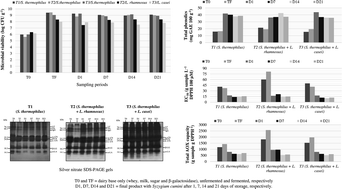Influence of co-cultures of Streptococcus thermophilus and probiotic lactobacilli on quality and antioxidant capacity parameters of lactose-free fermented dairy beverages containing Syzygium cumini (L.) Skeels pulp†
Abstract
This study investigated the influence of probiotic lactobacilli in co-culture with Streptococcus thermophilus on composition, physicochemical parameters, microbial viability, sensory acceptability, antioxidant capacity and protein profile of lactose-free fermented dairy beverages with added whey, β-galactosidase and jambolan (Syzygium cumini (L.) Skeels) pulp. Three beverages (T1, T2 and T3) were prepared with Streptococcus thermophilus TA-40 as starter culture. Lactobacillus rhamnosus LR32 and Lactobacillus casei BGP93 probiotic cultures were added into T2 and T3, respectively. The probiotic adjuvants slightly influenced the pH and titratable acidity of dairy beverages, with no influence on the proximate composition and on the sensory attributes. Samples presented fat and protein contents suitable to meet the requirements of “low-fat dairy beverages with non-dairy ingredients added” according to the Brazilian legislation, lactobacilli viability above 7 log CFU g−1 for both probiotics and total phenolic content around 40 mg GAE 100 g−1. Colour was the most evaluated sensory aspect (average scores close or higher than 8 in a scale from 0 to 10 for most of the sampling periods). The overall antioxidant capacity increased significantly following the addition of jambolan (p < 0.05), and significantly more during storage (p < 0.05), likely due to proteolysis verified in the electrophoresis gels, as a result of the metabolism of the lactic cultures. The dairy beverages studied are good options for functional foods due to their nutritional value, viability of probiotic lactobacilli, phenolic content, and antioxidant capacity, also serving lactose-intolerant people.



 Please wait while we load your content...
Please wait while we load your content...